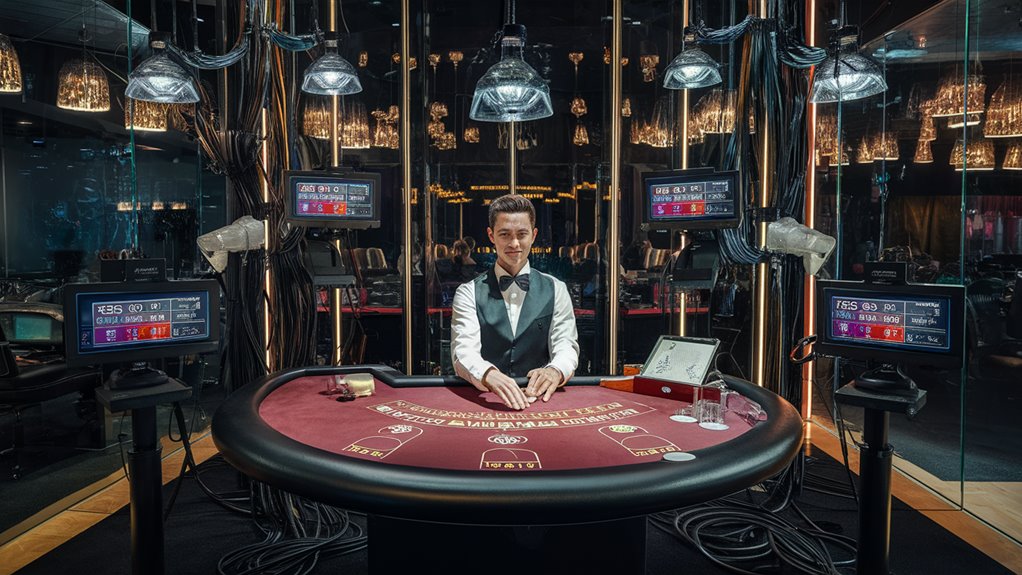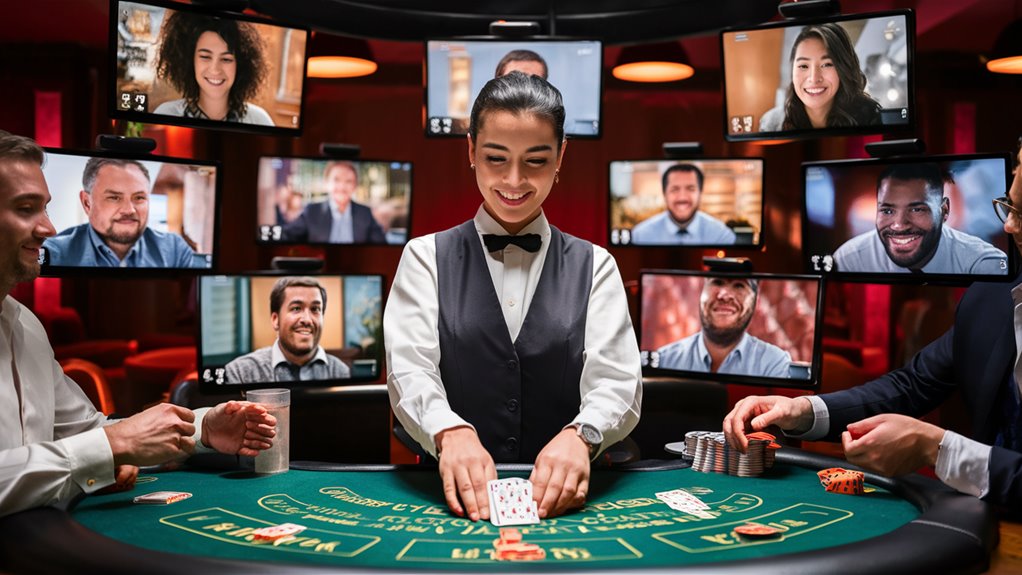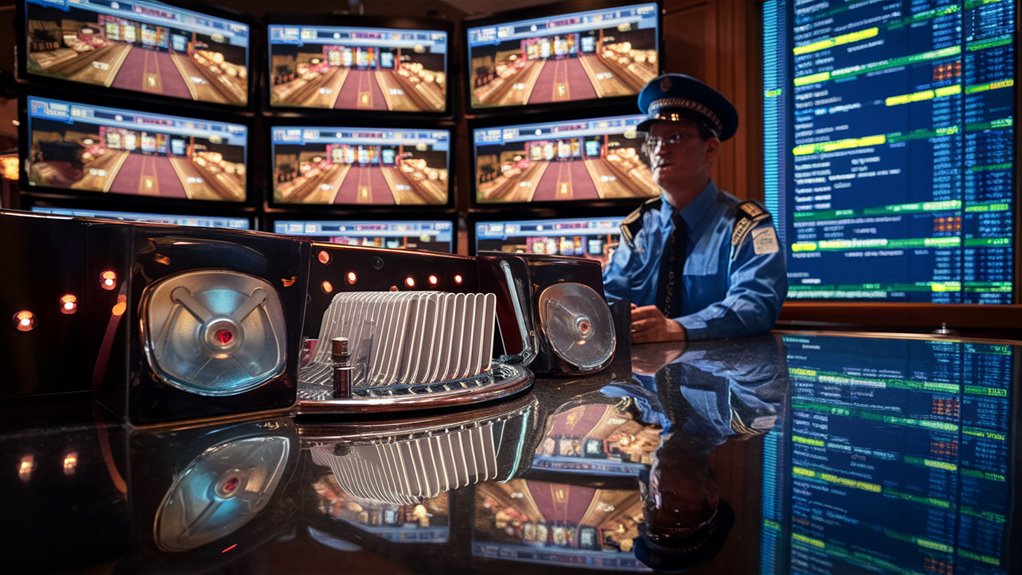How Has High-Speed Internet Revolutionized Live Dealer Casinos?
Key Takeaways
- High-speed internet enables seamless streaming of live casino games with minimal latency
- Advanced streaming technology and bandwidth improvements create immersive gaming experiences
- Real-time interaction between players and dealers now matches land-based casino quality
- Technical innovations have expanded live dealer gaming from niche to mainstream entertainment
High-speed internet has transformed live dealer casinos through advanced streaming technology and robust network infrastructure, creating an immersive gaming experience that rivals traditional casinos. This technological evolution crosses the bridge between online convenience and authentic casino atmosphere.
The Technical Foundation
Modern live dealer platforms leverage multiple technological components:
- Dedicated streaming servers for multi-angle HD video
- Low-latency networking protocols
- Real-time data synchronization
- Advanced encryption for secure transactions
Player Experience Improvements
The impact of high-speed connectivity extends to several key areas:
- Crystal-clear video quality at 1080p or higher
- Response times under 100 milliseconds
- Simultaneous multi-table gameplay
- Interactive chat features with dealers and other players
Future Developments
Emerging technologies are pushing boundaries further:
- 5G integration for mobile gaming
- Virtual reality implementation
- AI-enhanced player customization
- 4K streaming capabilities
This technological foundation continues evolving, making live dealer casinos increasingly sophisticated and accessible to a growing global audience. The combination of high-speed internet and cutting-edge streaming technology ensures that players receive an authentic casino experience from any connected device.
The Evolution of Online Gaming

How Has Online Gaming Evolved Over the Years?
Key Takeaways
- Online gaming transformed from basic virtual casinos to immersive experiences
- Technological advances enabled live dealer games and HD streaming
- Modern platforms utilize 5G networks and virtual reality integration
The Early Days: Mid-1990s
Online gaming began in the mid-1990s with basic virtual casinos offering simple slot machines and table games.
Dial-up internet connections limited these platforms to rudimentary graphics and slow gameplay speeds, making them vastly different from today’s sophisticated options.
The Broadband Revolution: Early 2000s
The introduction of broadband internet revolutionized online gaming capabilities.
Casino software developers implemented advanced random number generators and enhanced security protocols, establishing credibility among players who were initially hesitant to trust online platforms.
Live Gaming Breakthrough: 2010s
High-speed fiber optic networks marked a significant turning point in 2010, enabling HD video streaming capabilities.
This advancement introduced live dealer games, allowing players to interact with real croupiers in real-time.
The gaming selection expanded from basic blackjack and roulette to include:
- Live baccarat
- Game show-style entertainment
- Multiple game variations
Modern Gaming Experience
Today’s online gaming leverages cutting-edge technology:
- 5G networks for near-zero latency
- Advanced compression technologies
- Multi-camera viewing angles
- Interactive chat systems
- Virtual reality integration
These features create an immersive gaming experience that early online casino pioneers could only dream of, demonstrating the remarkable evolution of the industry over just a few decades.
Technology Behind Live Dealer Platforms

How Does Live Dealer Gaming Technology Work?
Key Takeaways
- Live dealer platforms combine HD cameras, OCR software, and Game Control Units for real-time gaming
- Advanced streaming technology ensures smooth gameplay with minimal latency
- Multi-layered security and integration systems protect user data and transactions
Core Technology Components
Live dealer gaming technology combines high-definition cameras, optical character recognition (OCR) software, and game control units (GCU) to create seamless real-time gaming experiences.
Think of it as a virtual bridge connecting you directly to a physical casino table, where every card dealt and every roulette spin happens in real-time.
Streaming and Video Technology
The backbone of live dealer platforms relies on sophisticated streaming technology that delivers crystal-clear video feeds with minimal delay.
Much like watching your favorite sports event live, these systems use:
- Advanced compression algorithms
- Adaptive bitrate streaming
- Multiple camera angles
- Real-time video synchronization
Integration and Backend Systems
Behind the scenes, a robust technology stack powers the entire operation:
- Digital overlay integration for betting options
- Load balancers for handling player traffic
- Redundant servers for uninterrupted gameplay
- Real-time database processing
- Secure payment systems
- Encrypted chat features
Want to place a bet? The system processes thousands of transactions simultaneously while maintaining game integrity and user security.
The integration layer combines live video feeds with digital elements seamlessly, creating an immersive gaming environment that feels just like being at a real casino table.
Through this sophisticated network of technologies working together, live dealer platforms deliver authentic casino experiences directly to your screen, protected by enterprise-grade security and powered by cutting-edge streaming capabilities.
Social Interaction in Virtual Casinos

How Do Virtual Casinos Create Social Interactions Online?
Key Takeaways
- Live dealer platforms combine video streaming and chat features to replicate authentic casino interactions
- Multi-player tables and VIP experiences enhance player engagement and community building
- High-speed internet enables smooth cross-cultural gaming experiences worldwide
The Technology Behind Virtual Casino Social Interaction
Live dealer platforms leverage high-speed internet and HD video streaming to transform online gambling into an interactive social experience.
Players can now engage with dealers and fellow gamblers in real-time through integrated chat features, creating natural conversations and shared experiences that mirror physical casino environments.
Advanced Social Features and Community Building
Multi-player tables represent the evolution of virtual casino socialization, enabling players to:
- View other participants’ reactions in real-time
- Engage in group discussions during gameplay
- Build relationships through VIP tables with dedicated dealers
- Develop regular connections with preferred gaming communities
Global Gaming Communities
Virtual casinos break geographical and cultural barriers through:
- Cross-cultural player interactions
- International dealer networks
- Real-time translation capabilities
- Lag-free communication systems
These technological advances have created vibrant global gaming communities where players from Tokyo can seamlessly interact with dealers from Latvia while enjoying smooth, delay-free gameplay experiences.
The combination of advanced streaming technology and social features has established unique international communities that traditional casinos can’t replicate.
Security and Fair Play Measures

How Do Online Casinos Protect Players and Ensure Fair Gaming?
Key Takeaways
- Multi-layer security protocols protect financial transactions and personal data
- Real-time monitoring and AI systems detect suspicious activities
- Regular audits by gaming authorities ensure compliance and fairness
- Advanced encryption and authentication prevent fraud
Advanced Security Measures
Modern online casinos implement military-grade encryption technology to safeguard your financial transactions and personal information.
This security framework makes it nearly impossible for unauthorized access to sensitive data during gameplay or banking operations.
Real-Time Monitoring Systems
Live dealer platforms utilize multiple camera angles and automated tracking systems to monitor every card dealt and bet placed.
Random number generators validate shuffling procedures, while gaming authorities conduct regular system audits to maintain strict compliance standards.
Player Protection Features
To create a secure gaming environment, online casinos employ:
- Multi-factor authentication for identity verification
- Detailed session logging and tracking
- AI-powered detection of suspicious betting patterns
- Automated systems to prevent collusion between players
Anti-Cheating Protocols
The following measures prevent unfair advantages:
- Regular dealer rotation schedules
- Automated card shuffling machines
- Strict dealer training requirements
- Frequent equipment calibration
- Real-time gameplay monitoring
These comprehensive security measures work together to deliver a gaming experience that matches or exceeds traditional casino standards.
Players can focus on enjoying their games while automated systems actively protect their interests and ensure fair play.
Global Market Growth and Expansion

How Is the Global Live Dealer Casino Market Evolving?
Key Takeaways
- Global live dealer casino revenue reached $5 billion in 2022
- Mobile access accounts for 60% of live dealer casino usage
- Market projections indicate $12 billion revenue by 2025
- Asia-Pacific leads market growth with key hubs in Malaysia, Singapore, and Philippines
Regional Market Development
The global live dealer casino market has transformed the online gambling landscape through high-speed internet connectivity and mobile technology advancement.
Asia-Pacific regions dominate market growth, with Malaysia, Singapore, and the Philippines establishing themselves as primary operational hubs. These locations leverage advanced infrastructure to serve players across multiple time zones effectively.
European and North American Expansion
European markets demonstrate substantial growth through strategic regulatory frameworks.
Malta and Latvia have emerged as premier licensing jurisdictions, balancing operator-friendly policies with strict oversight mechanisms.
The North American market shows increasing momentum, particularly in states like New Jersey and Pennsylvania, where live dealer operations now operate under official licenses.
Mobile Technology Impact
Mobile technology drives market accessibility, with smartphones representing over 60% of live dealer casino access.
This shift has opened doors to new demographic segments previously unreached by traditional casino platforms.
The implementation of 5G technology stands to further accelerate market growth, supporting revenue projections of $12 billion by 2025.
Future Growth Factors
- Expanding legalization across new jurisdictions
- Maturation of existing markets
- Enhanced connectivity through 5G networks
- Growing mobile device adoption
- Increased regulatory framework development